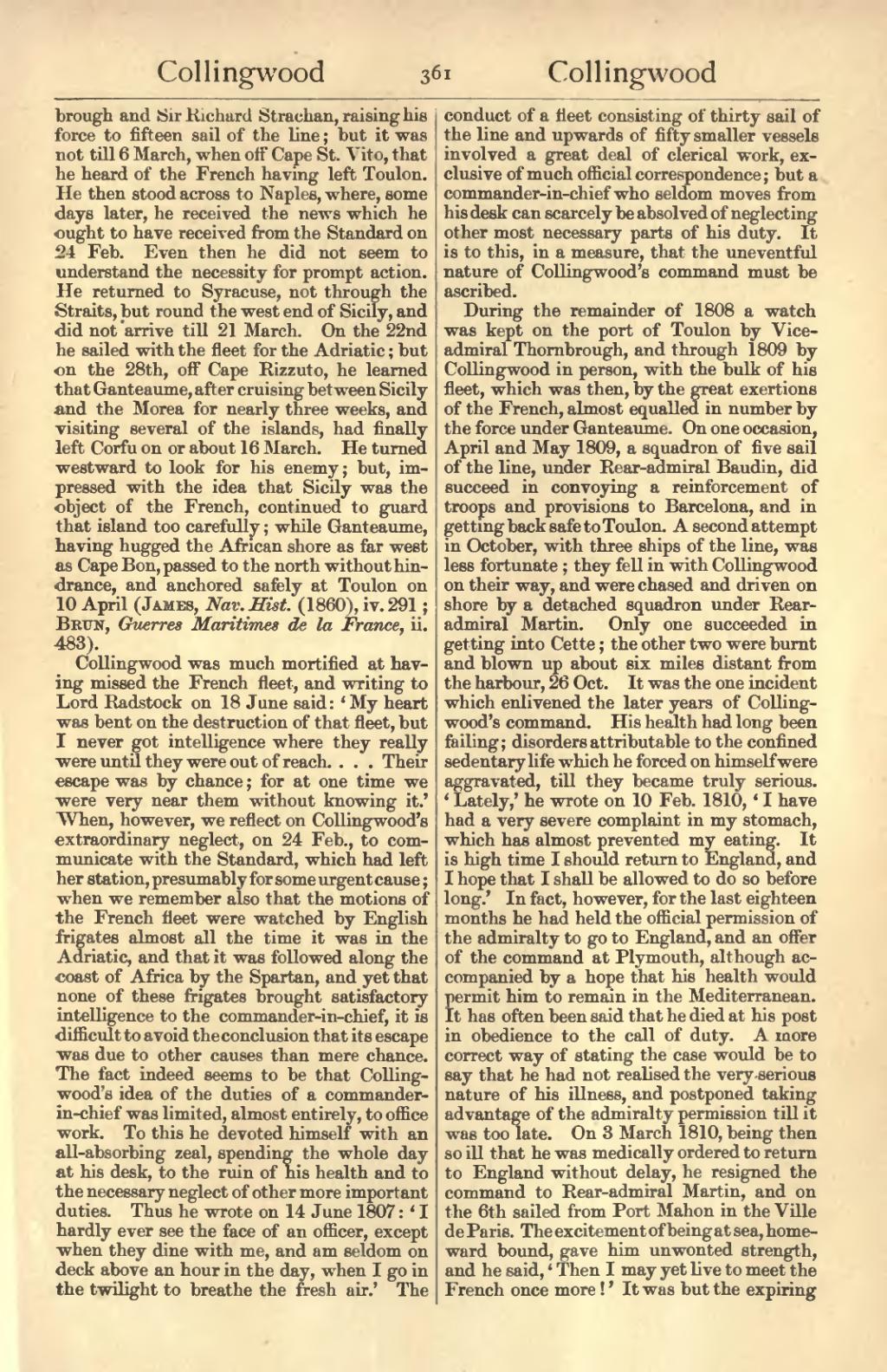brough and Sir Richard Strachan, raising his force to fifteen sail of the line ; but it was not till 6 March, when off Cape St. Vito, that he heard of the French having left Toulon. He then stood across to Naples, where, some days later, he received the news which he ought to have received from the Standard on 24 Feb. Even then he did not seem to understand the necessity for prompt action. He returned to Syracuse, not through the Straits, but round the west end of Sicily, and did not 'arrive till 21 March. On the 22nd he sailed with the fleet for the Adriatic ; but on the 28th, off Cape Rizzuto, he learned that Ganteaume, after cruising between Sicily and the Morea for nearly three weeks, and visiting several of the islands, had finally left Corfu on or about 16 March. He turned westward to look for his enemy ; but, impressed with the idea that Sicily was the object of the French, continued to guard that island too carefully ; while Ganteaume, having hugged the African shore as far west as Cape Bon, passed to the north without hindrance, and anchored safely at Toulon on 10 April (James, Nav. Hist. (1860), iv. 291 ; Brun, Guerres Maritimes de la France, ii. 483).
Collingwood was much mortified at having missed the French fleet, and writing to Lord Radstock on 18 June said : 'My heart was bent on the destruction of that fleet, but I never got intelligence where they really were until they were out of reach. . . . Their escape was by chance ; for at one time we were very near them without knowing it.' When, however, we reflect on Collingwood's extraordinary neglect, on 24 Feb., to communicate with the Standard, which had left her station, presumably for some urgent cause ; when we remember also that the motions of the French fleet were watched by English frigates almost all the time it was in the Adriatic, and that it was followed along the coast of Africa by the Spartan, and yet that none of these frigates brought satisfactory intelligence to the commander-in-chief, it is difficult to avoid the conclusion that its escape was due to other causes than mere chance. The fact indeed seems to be that Collingwood's idea of the duties of a commander-in-chief was limited, almost entirely, to office work. To this he devoted himself with an all-absorbing zeal, spending the whole day at his desk, to the ruin of his health and to the necessary neglect of other more important duties. Thus he wrote on 14 June 1807 : 'I hardly ever see the face of an officer, except when they dine with me, and am seldom on deck above an hour in the day, when I go in the twilight to breathe the fresh air.' The conduct of a fleet consisting of thirty sail of the line and upwards of fifty smaller vessels involved a great deal of clerical work, exclusive of much official correspondence ; but a commander-in-chief who seldom moves from his desk can scarcely be absolved of neglecting other most necessary parts of his duty. It is to this, in a measure, that the uneventful nature of Collingwood's command must be ascribed.
During the remainder of 1808 a watch was kept on the port of Toulon by Vice-admiral Thornbrough, and through 1809 by Collingwood in person, with the bulk of his fleet, which was then, by the great exertions of the French, almost equalled in number by the force under Ganteaume. On one occasion, April and May 1809, a squadron of five sail of the line, under Rear-admiral Baudin, did succeed in convoying a reinforcement of troops and provisions to Barcelona, and in getting back safe to Toulon. A second attempt in October, with three ships of the line, was less fortunate ; they fell in with Collingwood on their way, and were chased and driven on shore by a detached squadron under Rear-admiral Martin. Only one succeeded in getting into Cette ; the other two were burnt and blown up about six miles distant from the harbour, 26 Oct. It was the one incident which enlivened the later years of Collingwood's command. His health had long been failing ; disorders attributable to the confined sedentary life which he forced on himself were aggravated, till they became truly serious. 'Lately,' he wrote on 10 Feb. 1810, 'I have had a very severe complaint in my stomach, which has almost prevented my eating. It is high time I should return to England, and I hope that I shall be allowed to do so before long.' In fact, however, for the last eighteen months he had held the official permission of the admiralty to go to England, and an offer of the command at Plymouth, although accompanied by a hope that his health would permit him to remain in the Mediterranean. It has often been said that he died at his post in obedience to the call of duty. A more correct way of stating the case would be to say that he had not realised the very-serious nature of his illness, and postponed taking advantage of the admiralty permission till it was too late. On 3 March 1810, being then so ill that he was medically ordered to return to England without delay, he resigned the command to Rear-admiral Martin, and on the 6th sailed from Port Mahon in the Ville de Paris. The excitement of being at sea, homeward bound, gave him unwonted strength, and he said, 'Then I may yet live to meet the French once more!' It was but the expiring
